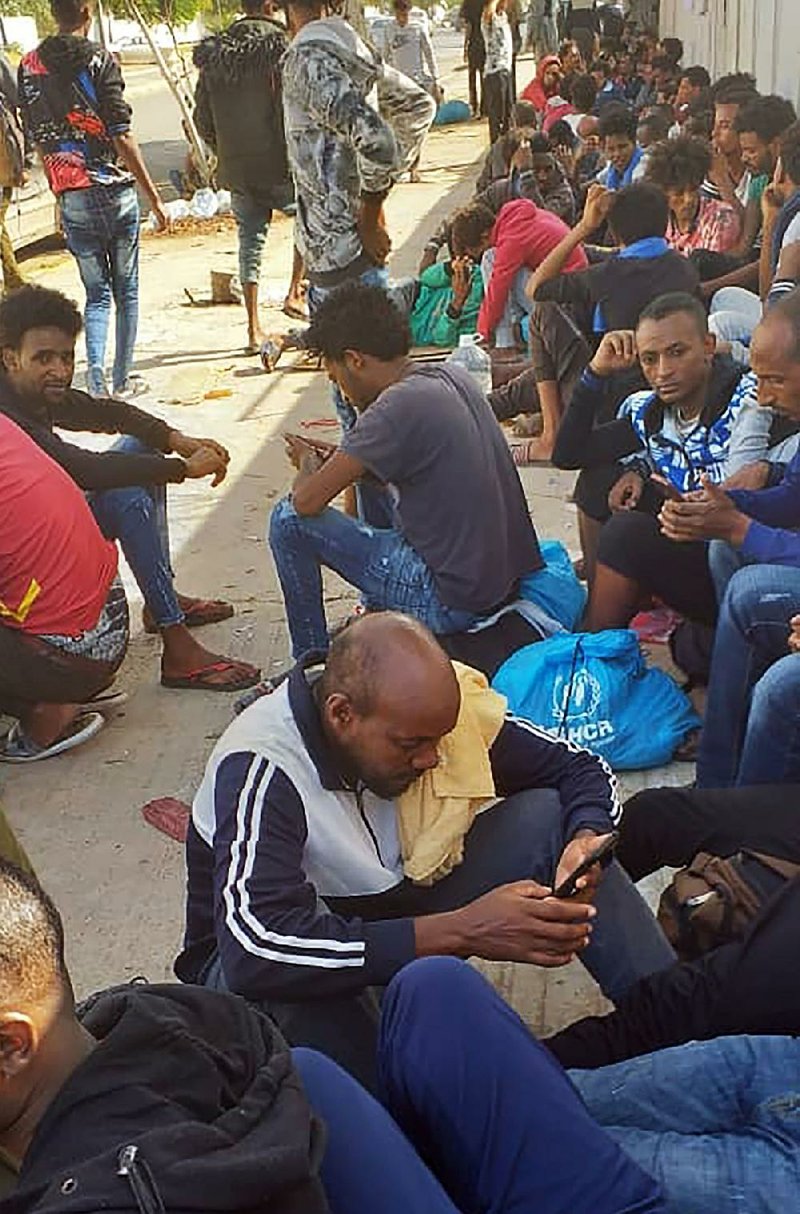Migrants report hunger at Libya center
PARIS — Hundreds of migrants have fled a detention center in coastal Libya and crowded overnight around a U.N. facility, saying they were denied food for weeks.
Around 450 people left the Abu Salim detention center late Tuesday. Two of the migrants, as well as activists, said they were forced to beg for money from families to pay police to buy them food. Those who couldn’t pay went hungry.
The migrants spoke Wednesday on condition of anonymity, fearing for their safety. They walked about 90 minutes through the city of Tripoli, according to Tarik Lamloum, a Libyan activist.
The U.N. refugee agency says the facility is already crowded, with about half of the 800 people inside arriving informally, including many from another detention center that was hit last summer by an airstrike. The Libyan government agency that runs the detention centers blocked the migrants from entering, the U.N. said.
The government-linked centers for migrants are rife with abuse and many, especially those in Tripoli, get caught in the crossfire of the country’s civil war. With increased fighting and reports of torture, Europe’s policy of supporting the Libyan coast guard as it intercepts people fleeing Libya has come under growing criticism.
Jean-Paul Cavalieri, the U.N. refugee agency’s chief of mission in Libya, said there was no space for more people inside the facility and that officials were on-site to offer options.
Colombia president oversees rebel hunt
TACUEYO, Colombia — President Ivan Duque traveled Wednesday to a conflict-ridden zone in Colombia’s southwest to oversee a military offensive aimed at hunting down a band of suspected renegade rebels blamed for the killing of five indigenous leaders.
The five people from the Tacueyo reservation were killed late Tuesday when their caravan of armored SUVs was ambushed by gunmen the government says belong to a faction of Revolutionary Armed Forces of Colombia that refused to accept the larger rebel group’s peace treaty with the government.
Among those killed was Cristina Bautista, the top authority and spiritual leader of the semiautonomous reservation in southwestern Colombia. Six other people were injured as the gunmen continued to fire at an ambulance tending to the injured.
Duque immediately condemned the “assassination” and ordered his military to step up operations in the area to hunt down the assailants.
Indigenous leaders have repeatedly condemned the government for standing by as a “genocide” takes place in communities caught in the crossfire of Colombia’s decades-long conflict between leftist rebels, right-wing paramilitaries and state security forces.
Dozens of indigenous and social leaders have been killed in the aftermath of Colombia’s historic 2016 peace accord as illegal armed groups and dissidents seek to exert control over former rebel territory and lucrative drug routes.
Fear rises for koalas after Australia fire
CANBERRA, Australia — Conservationists fear hundreds of koalas have perished in wildfires that have razed prime habitat on Australia’s east coast.
Port Macquarie Koala Hospital President Sue Ashton said she hoped wildlife authorities would be allowed to begin their search of the fire zone for survivors today. The fire was started by a lightning strike Friday in a forest in New South Wales state, 190 miles north of Sydney, and has since burnt 4,900 acres.
Two-thirds of that area was koala habitat, Ashton said.
“If we look at a 50% survival rate, that’s around about 350 koalas, and that’s absolutely devastating,” Ashton said of the death toll.
“We’re hoping it’s not as bad as that, but because of the intensity of the fire and the way koalas behave during fire, we’re not holding out too much hope,” she added.
Koalas climb high into trees during wildfires and survive if the fire front passes quickly below them.
The koala colony was particularly healthy and genetically diverse, Ashton said. Koalas prefer coastal forests, which are being cleared for suburban expansion. Increasingly isolated koala colonies have become inbred and diseased.
Malaria cases up in Burundi, WHO says
LONDON — The World Health Organization says more than 7 million cases of malaria have been reported in Burundi this year. Officials blame the outbreak on factors including the lack of protective bed nets, problems with medicines and climate change.
The U.N. health agency says malaria has killed nearly 2,700 people this year in the East African nation and caused 64% more cases than in 2018.
The agency says there is “probably a decrease in the effectiveness of treatment, which is still under investigation.” It says Burundi is ordering new medicines and planning campaigns to spray homes with insecticide and distribute bed nets.
Scientists fear rising temperatures will result in a spike in mosquitoes, which spread malaria and other diseases.
Globally, malaria sickens about 219 million people every year.

